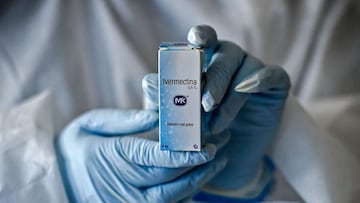What does the FDA say about using ivermectin to treat Covid-19?
In an attempt to prevent covid-19, people are turning to a drug designed to treat parasites in livestock, leading to a surge in calls to US poison control.


The United States still finds itself deep into its newest wave of covid-19 infections driven by the more contagious Delta variant. While demand for vaccines has increased in recent weeks, many skeptics still perpetuate dangerous conspiracy theories.
The latest is that ivermectin, a drug normally used for parasites in livestock, prevents and treats covid-19. As the drug’s popularity peaks on social media and other places, the rate of prescriptions for the ivermectin has increased exponentially in recent weeks.
Before the pandemic, an average of 3,600 prescriptions were written for the drug each week. Over the last month, according to data from the Centers for Disease Control and Prevention (CDC), this average has jumped to 88,000.
What has the FDA said about the use of ivermectin?
On 3 September, the FDA posted an update on its website titled, ‘Why You Should Not Use Ivermectin to Treat or Prevent COVID-19’. The update begins by articulating that the health agency understands that as time goes on and the anxiety of living with covid-19 grows, it is “not surprising” that people may look to “drugs not approved or authorized."
Ivermectin is an anti-parasitic medication. If people use it in large doses, with quantities appropriate for horses not humans, they could experience major side effects including liver damage. It is NOT effective for treating #covid19 and should not be taken for that purpose. pic.twitter.com/t5xJTNuKJd
— Leana Wen, M.D. (@DrLeanaWen) September 2, 2021
However, concerning ivermectin, they also wrote that while the FDA has approved the use of the drug “at very specific doses to treat some parasitic worms, and there are topical (on the skin) formulations for head lice and skin conditions like rosacea.”
The article clearly states that at this point, the organization has not evaluated its effects in treating covid-19 and warns that its use, especially those procuring ivermectin developed for livestock, is hazardous.
Ivermectin to treat livestock flies off the shelves
One alarming feature of the ivermectin trend is that the demand for the product intended for use in livestock has increased dramatically. Some of those unable to get a prescription from their doctors have turned to feed stores to buy the version made for farm animals, including horses.
Demand for the deworming drug Ivermectin has grown despite no clinical evidence that it works to treat COVID-19 patients and warnings from public health departments including the CDC and FDA on its potential dangers. @doctorswid joins us. LISTEN: https://t.co/OCNTZEVAPY pic.twitter.com/0G9LmlXR4V
— Start Here - The Daily Podcast from ABC News (@StartHereABC) September 2, 2021
The FDA wrote in their article that “animal drugs are often highly concentrated because they are used for large animals like horses and cows, which weigh a lot more than we do—a ton or more.”
Dangers of the inactive ingredients
Additionally, when the FDA evaluates a new drug, they look at both the active and inactive ingredients. Many of the inactive ingredients used to create the products for livestock "can be highly toxic in humans." Many inactive ingredients found have not been tested for human use and the agency does not know how these ingredients impact the way “ivermectin is absorbed in the human body.”
How many people have taken the drug?
Calculating how many people have taken either the drug intended for humans or animals is unknown. Although, the number of people falling ill from their use is not, and this is not a case of a few people trying the “treatment.”
The National Poison Data System, which compiles reports from fifty-five poison control centers across the US, reported a 245% jump in cases from July to August. In July, 133 cases were reported, and in August, that figure rose to 459.
The New York Times reported that in Mississippi, the health authorities had published data showing that earlier this month that “70 percent of recent calls to the state poison control center had come from people who ingested ivermectin from livestock supply stores.”
What are the side effects of an ivermectin overdose?
The CDC has put out an emergency alert to warn the public of the possible dangers of using this drug without guidance from a medical professional. Some of the side effects caused by the drug include:
- gastrointestinal effects (nausea, vomiting, abdominal pain, and diarrhea)
- headache
- blurred vision
- dizziness
- fast heart rate
- low blood pressure.
The FDA has released a similar warning stating that “even the levels of ivermectin for approved human uses can interact with other medications, like blood-thinners.”
These interactions with other drugs and even ivermectin alone can lead to an overdose, the symptoms of which include “nausea, vomiting, diarrhea, hypotension (low blood pressure), allergic reactions (itching and hives), dizziness, ataxia (problems with balance), seizures, coma, and even death.”
While people may be more inclined to follow medical advice from friends and family or those they interact with on social media, the medical community urges caution.
What steps can you take to prevent covid-19?
As unfortunate as it sounds, there are no quick fixes to ending the covid-19 pandemic.
Putting your hope in products that have yet to undergo scientific and medical studies could cost you your life.
Related stories
The most effective way to prevent a severe covid-19 infection is to get vaccinated.
While that may not be what those skeptical of the vaccine want to hear, it is true. While there is still a risk of infection after vaccination, the data shows that those who get their shots are less likely to experience severe symptoms, require hospitalization, and, most importantly, die.

